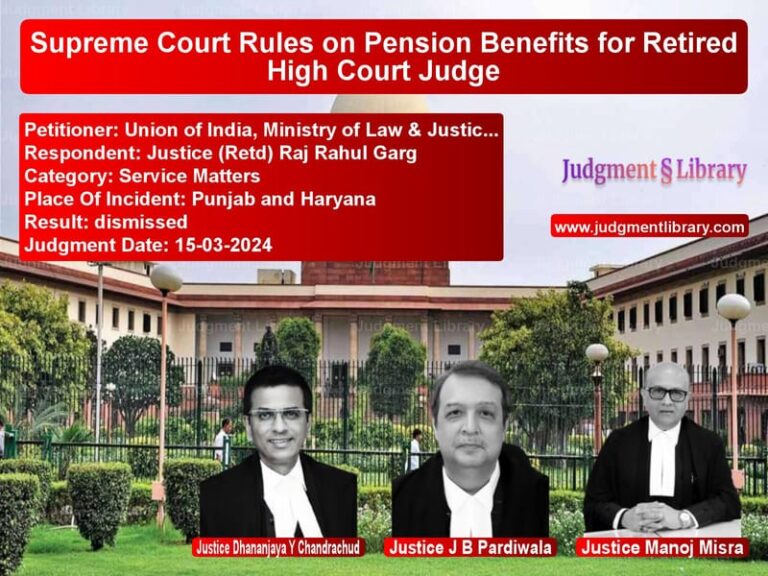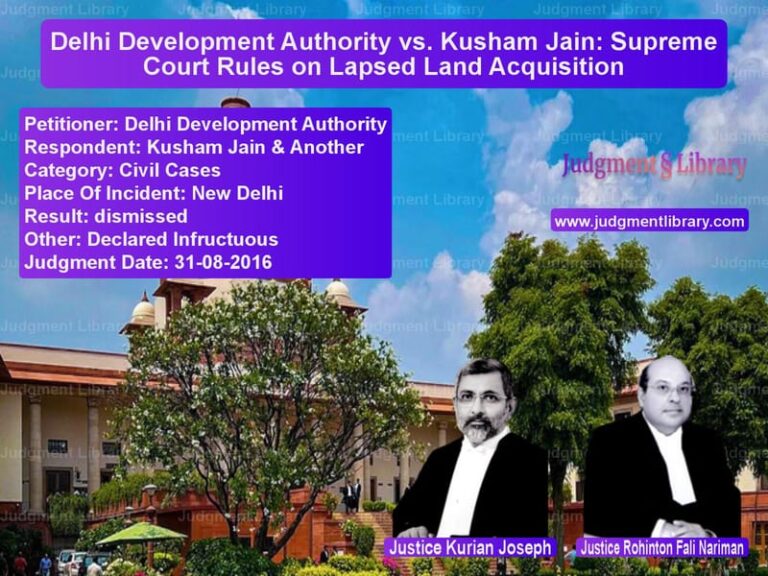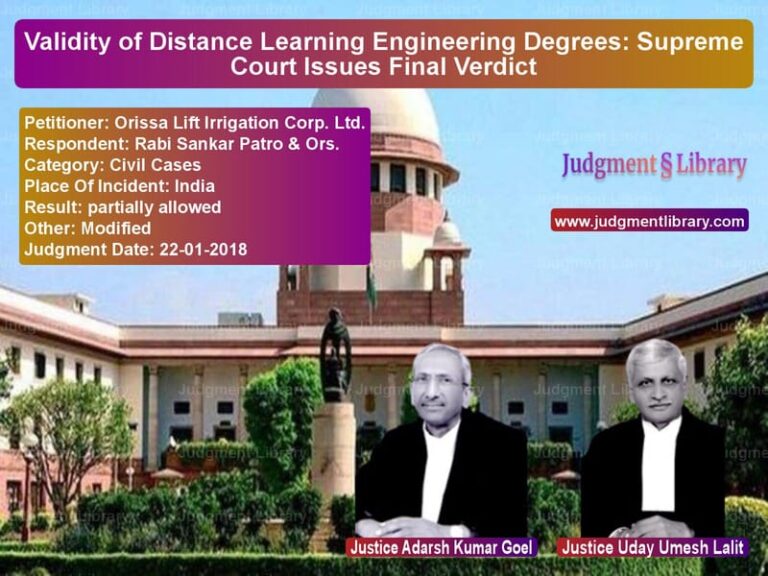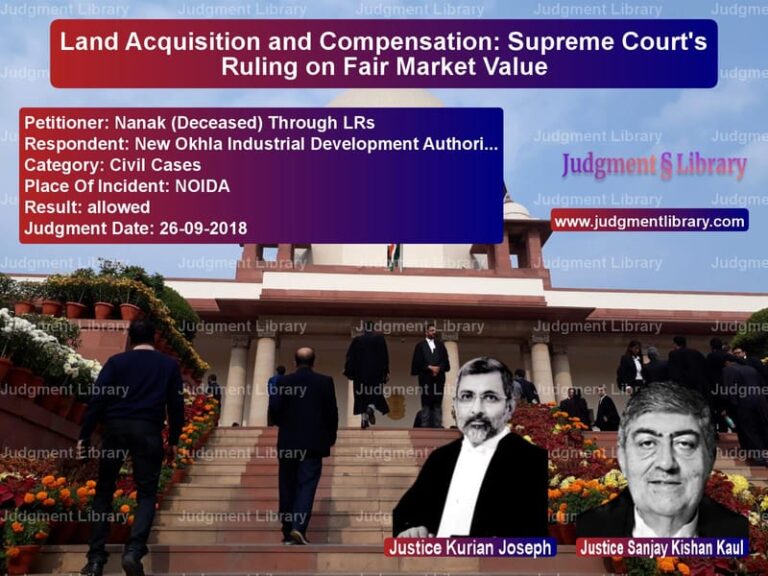Supreme Court Upholds Maharashtra Caste Scrutiny Rules and Verification Process
The Supreme Court of India, in the case of Dist. Collector Satara & Anr. v. Mangesh Nivrutti Kashid & Ors., upheld the validity of the Maharashtra government’s caste verification and scrutiny process. The judgment reaffirms the legal framework established for verifying caste certificates to ensure that benefits intended for Scheduled Castes (SCs), Scheduled Tribes (STs), and Other Backward Classes (OBCs) are not misused by ineligible individuals.
Background of the Case
The case arose from a dispute regarding the issuance and verification of caste certificates in Maharashtra. The government had enacted the Maharashtra Scheduled Castes, Scheduled Tribes, De-notified Tribes (Vimukta Jatis), Nomadic Tribes, Other Backward Classes and Special Backward Category (Regulation of Issuance and Verification of) Caste Certificate Act, 2000 to regulate the process. The Act aimed to prevent fraudulent claims to caste-based reservations in education, employment, and elections.
Despite these regulations, fraudulent caste certificates remained a widespread issue, leading to litigation over the proper implementation of verification procedures. The petitioner, the District Collector of Satara, challenged the caste verification process and sought stricter enforcement mechanisms.
Arguments by the Petitioner (District Collector, Satara)
The petitioners presented the following arguments:
- The government’s existing verification mechanisms were insufficient to prevent fraudulent caste certificates.
- The state should establish more stringent scrutiny committees with enhanced investigative powers.
- The verification process should include detailed background checks, including verification of ancestral records, social customs, and traditional practices.
- The judiciary should uphold strict compliance with the Kumari Madhuri Patil v. Additional Commissioner, Tribal Development guidelines for caste verification.
Arguments by the Respondent (Mangesh Nivrutti Kashid & Ors.)
The respondents countered with the following points:
- The existing verification framework, as defined under the Maharashtra Caste Certificate Act, 2000, was already sufficient to ensure fairness.
- The burden of proof for challenging caste certificates should not be disproportionately placed on individuals.
- Delays in the verification process led to hardship for genuine beneficiaries, who faced challenges in accessing education and employment.
- Administrative lapses should not be a reason to deny rightful benefits to deserving individuals.
Supreme Court’s Observations
A bench comprising Justices Sanjay Kishan Kaul and K.M. Joseph ruled in favor of upholding the caste verification framework while emphasizing the importance of procedural fairness. The Court made the following observations:
- The Constitution mandates special provisions for SCs, STs, and OBCs to address historical injustices.
- Issuance of fraudulent caste certificates undermines the rights of genuine beneficiaries and distorts the purpose of reservations.
- The government has the authority to establish scrutiny committees with the power to investigate and verify caste claims.
- The vigilance cell’s role in verifying caste status should be reinforced, and state authorities must strictly adhere to prescribed guidelines.
- The Kumari Madhuri Patil guidelines remain a valid judicial framework, but state governments may introduce additional measures for more effective implementation.
The Court noted:
“The constitutional objective of ensuring social justice for Scheduled Castes and Scheduled Tribes cannot be defeated by fraudulent claims. Verification committees must exercise due diligence in scrutinizing caste certificates.”
Final Judgment
The Supreme Court issued the following directives:
- The appeals filed by the District Collector, Satara, were dismissed.
- The Maharashtra Caste Verification Rules were upheld as valid.
- The scrutiny committees must conduct caste verification in a fair but rigorous manner.
- Individuals found guilty of submitting fraudulent caste certificates would face legal consequences, including cancellation of benefits and prosecution.
- All future caste certificate verification processes must be conducted in compliance with the Maharashtra Caste Verification Rules and judicial guidelines.
Implications of the Judgment
The ruling has significant implications for caste verification procedures across India:
- Strengthening Verification Mechanisms: State governments must ensure that scrutiny committees function effectively to prevent fraudulent claims.
- Protection of Reservation Benefits: Genuine beneficiaries of caste-based reservations are safeguarded from undue competition by ineligible claimants.
- Legal Consequences for Fraud: The judgment reinforces that submitting false caste claims carries severe penalties, deterring misuse of reservations.
- Judicial Endorsement of Caste Verification Framework: The Supreme Court’s endorsement strengthens the legal foundation for caste scrutiny committees.
Conclusion
The Supreme Court’s decision in Dist. Collector Satara & Anr. v. Mangesh Nivrutti Kashid & Ors. upholds the legal framework for caste verification in Maharashtra while reinforcing the need for strict scrutiny of caste certificates. The ruling affirms the government’s responsibility to ensure that only genuine beneficiaries receive caste-based reservations and prevents fraudulent claims from undermining the system. The judgment sets a precedent for similar cases and serves as a guiding principle for other states implementing caste verification laws.
Petitioner Name: Dist. Collector Satara & Anr..Respondent Name: Mangesh Nivrutti Kashid & Ors..Judgment By: Justice Sanjay Kishan Kaul, Justice K.M. Joseph.Place Of Incident: Maharashtra.Judgment Date: 01-10-2019.
Don’t miss out on the full details! Download the complete judgment in PDF format below and gain valuable insights instantly!
Download Judgment: Dist. Collector Sata vs Mangesh Nivrutti Kas Supreme Court of India Judgment Dated 01-10-2019.pdf
Direct Downlaod Judgment: Direct downlaod this Judgment
See all petitions in Fundamental Rights
See all petitions in Public Interest Litigation
See all petitions in Legislative Powers
See all petitions in Judgment by Sanjay Kishan Kaul
See all petitions in Judgment by K.M. Joseph
See all petitions in dismissed
See all petitions in Quashed
See all petitions in supreme court of India judgments October 2019
See all petitions in 2019 judgments
See all posts in Constitutional Cases Category
See all allowed petitions in Constitutional Cases Category
See all Dismissed petitions in Constitutional Cases Category
See all partially allowed petitions in Constitutional Cases Category







